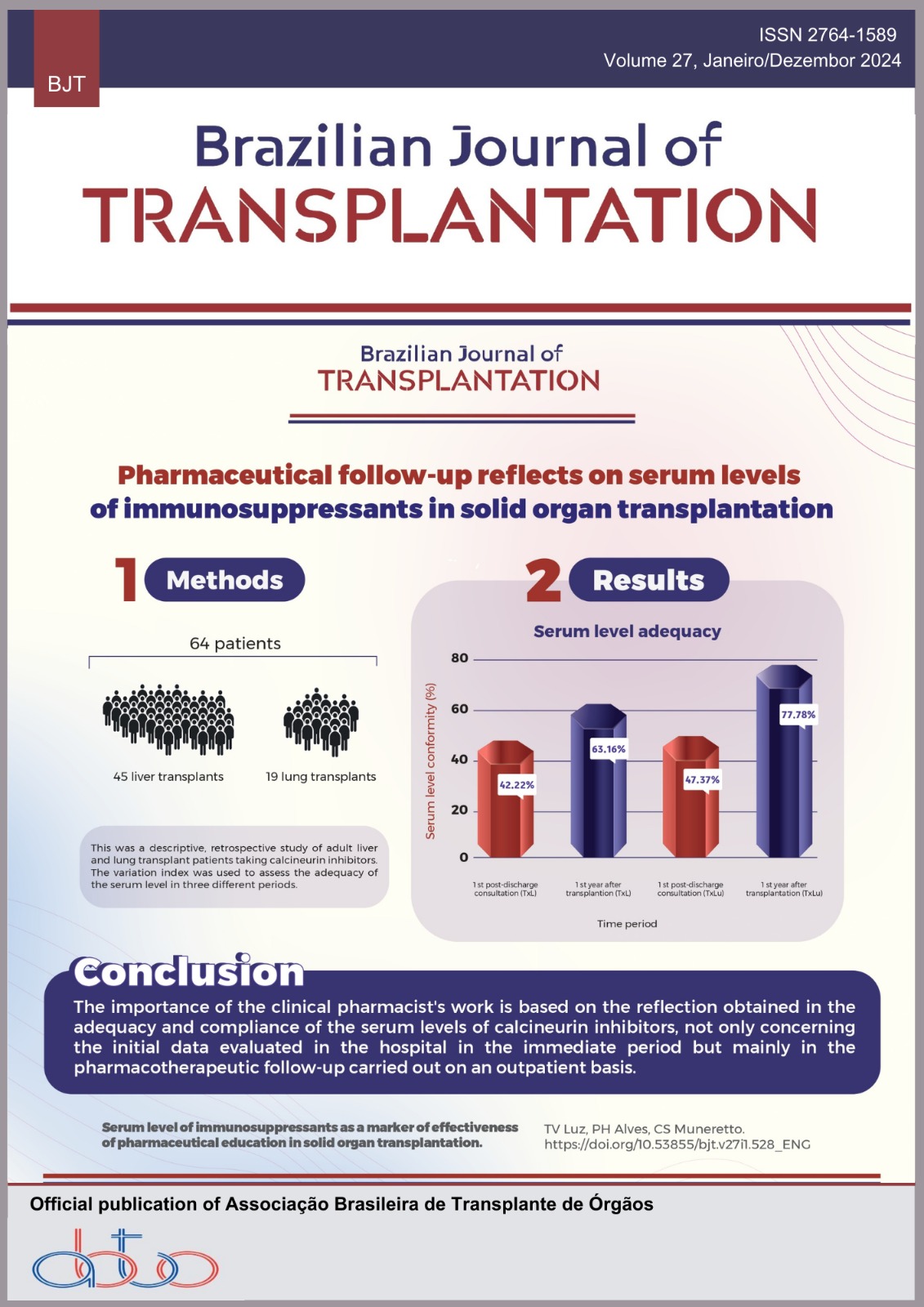Recurrent Parvovirus B19-Associated Pure Red Cell Aplasia: A Challenging Disease in Kidney Transplantation
Keywords:
Parvovirus B19, Anemia, Kidney transplant, Imunoglobulin, ImmunosupressionAbstract
Parvovirus B19 (PVB19)-associated pure red cell aplasia (PRCA) is an important diagnosis to consider in kidney transplant (KT) recipients experiencing persistent anemia, in whom other etiologies have been excluded. Its management poses a challenge since reducing immunosuppression (IS) to address the viral infection needs to be carefully balanced with the increased risk of allograft rejection. The authors describe a case of a 43-year-old male with a history of chronic kidney disease of unknown etiology who underwent a KT from a deceased donor after circulatory death in January 2021. In the 1st year post-KT, the patient was repeatedly admitted due to the recurrence of PVB19-associated PRCA, requiring blood transfusions and intravenous immunoglobulin (IVIG). IS was initially adjusted with mycophenolate mofetil (MMF) suspension and later transitioned to a TRANSFORM scheme with prednisolone, tacrolimus, and everolimus. Due to deteriorating kidney function, a kidney biopsy was performed and revealed borderline acute T-cell mediated rejection with significant signs of chronicity (50% of interstitial fibrosis and tubular atrophy). To guarantee infection control, IS was not increased. Considering the recurrence of PVB19-associated PRCA, despite the use of a TRANSFORM IS scheme in a patient with chronic allograft dysfunction and high immunologic risk, maintenance therapy with IVIG (0,4 mg/kg) every 4 weeks was started. After 9 months of maintenance therapy, no relapse was identified. To promote an individualized IS prescription, an ImmunoBiogram® was recently performed and an IS reduction is planned, followed by an ImmunoBiogram® control, which will potentially allow the suspension of IVIG maintenance therapy. The diagnosis and management of PVB19-associated PRCA is challenging. Regarding recurrent disease, prolonged IVIG treatment appears to be a useful treatment strategy, but more studies are necessary to ascertain its role. It is also fundamental to tailor the IS as much as possible to the individualized immunologic profile of the patients to prevent overimmunosuppression.
Downloads
References
Sharma N, Bajwa R. Parvovirus infection-related anemia after kidney transplantation. Case Rep Transplant 2020:6437392. https://doi.org/10.1155/2020/6437392
Gang S, Park S, Min SI, Hong J, Chang YH, Ha J, et al. Recurrent parvovirus B19 infection-associated pure red cell aplasia in a kidney transplant patient. Korean J Transplant 2020;34(3):199-203. https://doi.org/10.4285/kjt.2020.34.3.199
Thongprayoon C, Khoury NJ, Bathini T, Aeddula NR, Boonpheng B, Lertjitbanjong P, et al. Epidemiology of parvovirus B19 and anemia among kidney transplant recipients: a meta-analysis. Urol Ann 2020;12(3):241-7. https://doi.org/10.4103/UA.UA_89_19
An HPH, Diem HT, Cuong NT. Parvovirus B19-associated anemia in kidney transplant recipients: a single-center experience. Transplant Proc 2019;51(8):2693-6. https://doi.org/10.1016/j.transproceed.2019.03.076
Krishnan P, Ramadas P, Rajendran PP, Madhavan P, Alex A, Jayaschandran V, et al. Effects of parvovirus B19 Infection in renal transplant recipients: a retrospective review of three cases. Int J Angiol 2015;24(2):87-92. https://doi.org/10.1055/s-0034-1371759
Plentz A, Wurdinger M, Kudlich M, Modrow S. Low-level DNAemia of parvovirus B19 (genotypes 1-3) in adult transplant recipients is not associated with anaemia. J Clin Virol 2013;58(2):443-8. https://doi.org/10.1016/j.jcv.2013.07.007
Inamdar N, Nada R, Minz R, Kenwar DB, Singh S, Sharma A, et al. Successful re-transplantation in patient with recurrent parvovirus B19 pure red cell aplasia. Transpl Infect Dis 2019;21(6):e13164. https://doi.org/10.1111/tid.13164
Yu Y, Bao R, Lyu J, Wu J, Chen J, Peng W. Foscarnet therapy for pure red cell aplasia related to human parvovirus B19 infection in kidney transplant recipients: a preliminary exploration. Infect Drug Resist 2021;14:2911-23. https://doi.org/10.2147/IDR.S321936
Egbuna O, Zand MS, Arbini A, Menegus M, Taylor J. A cluster of parvovirus B19 infections in renal transplant recipients: a prospective case series and review of the literature. Am J Transplant 2006;6(1):225-31. https://doi.org/10.1111/j.1600-6143.2005.01139.x
Bentata Y. Parvovirus B19 in kidney transplantation: key points and essential pitfalls to know. Infect Dis 2021;53(6):404-8. https://doi.org/10.1080/23744235.2021.1893379
Eid AJ, Ardura MI. Practice ASTIDCo. Human parvovirus B19 in solid organ transplantation: guidelines from the American Society of Transplantation infectious diseases community of practice. Clin Transplant 2019;33(9):e13535. https://doi.org/10.1111/ctr.13535
Gor D, Singh V, Gupta V, Levitt M. A persistent parvovirus infection causing anemia in an HIV patient requiring intravenous immunoglobulin maintenance therapy. Cureus 2022;14(4):e24627. https://doi.org/10.7759/cureus.24627
Portoles JM, Jimenez C, Janeiro D, Lopez-Oliva MO, Ortega-Carrion A, Blanquez D, et al. The immunobiogram, a novel in vitro assay to evaluate treatment resistance in patients receiving immunosuppressive therapy. Front Immunol 2020;11:618202. https://doi.org/10.3389/fimmu.2020.618202
Pascual J, Jimenez C, Krajewska M, Seron D, Kotton CN, Portoles J, et al. The Immunobiogram, a novel in vitro diagnostic test to measure the pharmacodynamic response to immunosuppressive therapy in kidney transplant patients. Transpl Immunol 2022;75:101711. https://doi.org/10.1016/j.trim.2022.101711
Downloads
Published
How to Cite
Issue
Section
License
Copyright (c) 2024 Núria Paulo, Carolina Ferreira, Ana Cerqueira, Susana Sampaio, Manuel Pestana

This work is licensed under a Creative Commons Attribution 4.0 International License.









